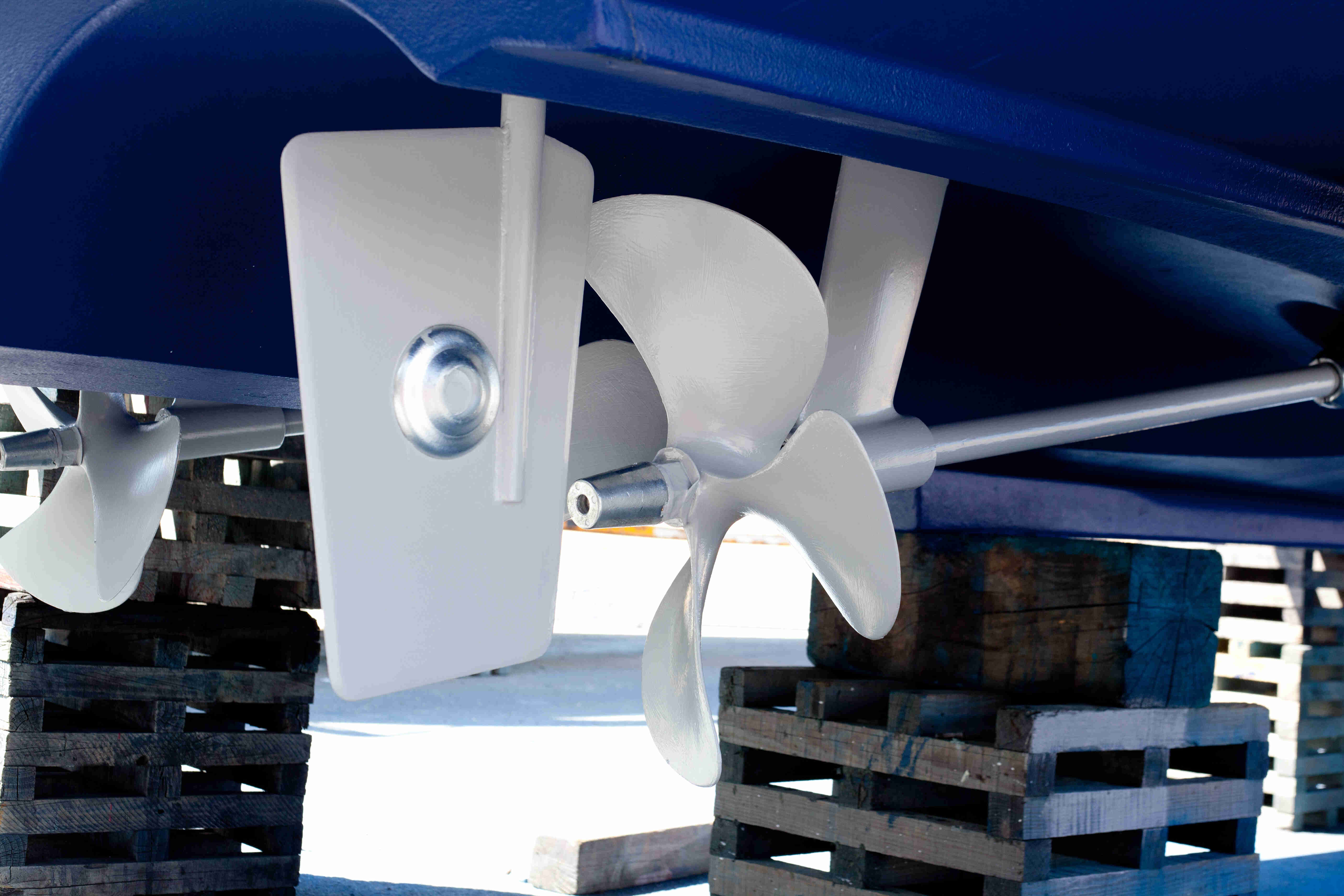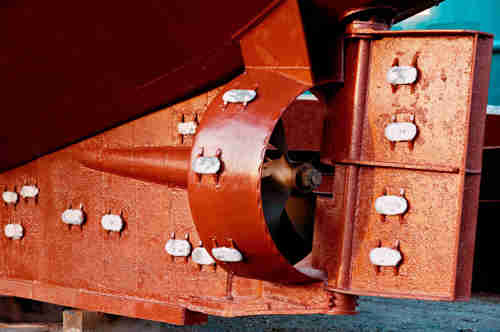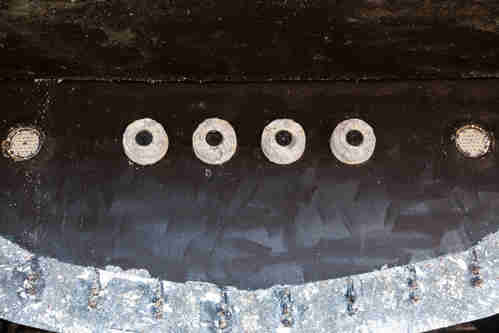Boat anodes: What you need to know
04 June 2025

The most seasoned boaters know that good maintenance starts with the little things – like anodes. They may be small and easy to overlook, but anodes are your boat's first port of call in the fight against the damaging effects of corrosion.
These small sacrificial metals quietly protect vital components like the hull, propeller, and engine, so looking after your anodes is one of the most crucial parts of boat maintenance. Regularly checking and replacing them not only extends the life of your vessel but also saves you from serious and expensive issues down the line.
In this guide, we'll explain how anodes work, why they matter, and how to ensure they're doing their job.

What are boat anodes?
Boat anodes help protect metal underwater from electrolytic corrosion. Sacrificial anodes are made from metals that are more reactive than the materials used in your boat’s components. Their purpose is simple: to corrode so your boat doesn't have to. Typically, they're bolted on or electrically bonded to key parts of the vessel to provide targeted protection.
Why do we need anodes?
When two metals are connected and sit in seawater, they act like batteries. A small electric current flows between them, causing one of the metals to slowly break down and release tiny particles into the water. This process is called galvanic corrosion; if it's not controlled, it can quickly damage underwater metal parts.
The speed at which metals corrode depends largely on the environment they're exposed to – corrosion tends to occur slowly in the air, more rapidly in freshwater and can happen very quickly in the highly aggressive conditions of seawater.
You can use various methods to slow down or prevent the corrosion of underwater components – such as galvanising, painting, or applying various waterproof coatings. However, these solutions aren't always suitable or effective in every situation. This is why we look to boat anodes, which use chemistry to protect them instead of excluding water from the metal's surface.

How do boat anodes work?
You might have seen photos of large steel structures used offshore before they were put into the water. These structures are covered with anodes to help slow down corrosion. After they're launched, divers regularly replace the anodes to keep the protection level high. These anodes are usually made from aluminium because it's cheaper, lighter, and more widely available than zinc. The purpose here is that the aluminium anodes corrode instead of the steel.
Using anodes can be a bit more complicated on boats because different types of metals are often used together.
For example, a bronze propeller and a stainless-steel shaft form a "galvanic couple", meaning one metal will start to corrode to protect the other. In this case, the bronze propeller will corrode faster to protect the stainless-steel shaft – which isn't ideal since you'd rather not lose your propeller.
To fix this, a zinc or aluminium anode is added. This anode will corrode first, protecting the propeller and the shaft from damage.
To make sure an anode works well, there are a few simple rules to follow:
- The anode must have a solid electrical connection to the part it’s protecting. The closer the anode is to the part it's protecting, the better it works.
- The anode needs to be able to "see" the part it’s protecting. This means it should be in a direct line with it because the protective ions in seawater travel mostly in straight lines and don't easily flow around corners. In situations where the anode can't be placed directly on or near the part – such as when the shaft isn't visible ahead of the propeller – it needs to be installed as close as possible to the shaft and propeller. A wire can then run inside the boat to electrically connect the anode to the propeller.
- When testing this connection with a meter, the resistance should be very low – ideally zero, but definitely less than 0.2 ohms.
What is the best anode for a boat?
The type of anode required for your boat, will depend on the type of water where your boat is being kept. With three options to choose from, we’ll explain the benefits for each and who they are most suited for:
- Zinc anodes are suitable for saltwater as heavier metals dissolve at a slower rate. They have a higher density and structural composition, providing significantly higher impact strength in areas such as the hull and propeller. As they're more common, zinc anodes are available in a greater range of shapes and sizes – making them especially useful on narrower boats.
- Aluminium anodes are most suitable for salt and brackish water. They have an electrical capacity up to three times higher than zinc anodes, enabling you to protect a larger area with fewer anodes (especially useful on areas like the hull). Other plus points include a slower corrosion rate and a more affordable cost (they are lighter to ship). Their higher electrical capacity makes them smaller and more compact than their zinc and magnesium counterparts.
- Magnesium anodes should only be used in freshwater, such as rivers or canals. A softer metal is required because electricity does not flow through freshwater quickly. These anodes are much lighter than zinc anodes, which can result in energy and fuel savings.
How often should you change anodes on a boat?
The replacement frequency depends on the type of anode, the water conditions, and the size of the boat. Anodes should be inspected at least annually and, in general, replaced if:
- More than 50% has wasted
- It has lost its original shape or has any paint and corrosion deposits.
Anodes may need to be replaced more frequently for boats that are used heavily or operate in highly corrosive water. We recommend having a qualified engineer inspect and replace your anodes.
Can you run a boat without an anode?
Whilst a boat can run without an anode, it's typically not recommended. Without anodes, parts will corrode faster, leading to expensive, more frequent repairs or damage – which could have been prevented had you simply installed and maintained the right anodes in the first place.

Specialist boat insurance through GJW Direct
Boat anodes can help protect parts of your boat from corrosion, but you may also want to consider getting specialist boat insurance to further protect your boat should the worst happen.
Having specialist boat insurance in place can help protect your boat from things like accidental damage and theft, plus give you peace of mind should anything happen out on the water.
Get a quote today to see how much your cover could cost.
Please note the information provided on this page should not be taken as advice and has been written as a matter of opinion. For more on insurance cover and policy wording, see our homepage.
Got a question? Call our UK call centre 0151 473 8000
©Copyright Ripe Thinking Limited 2026. GJWDirect® is a registered trademark and a trading name of Ripe Insurance Services Limited which is Authorised and Regulated by the Financial Conduct Authority No.313411.
Registered office: One Stockport Exchange, Railway Road, Stockport, United Kingdom, SK1 3SW. Registered in England No. 04507332.
